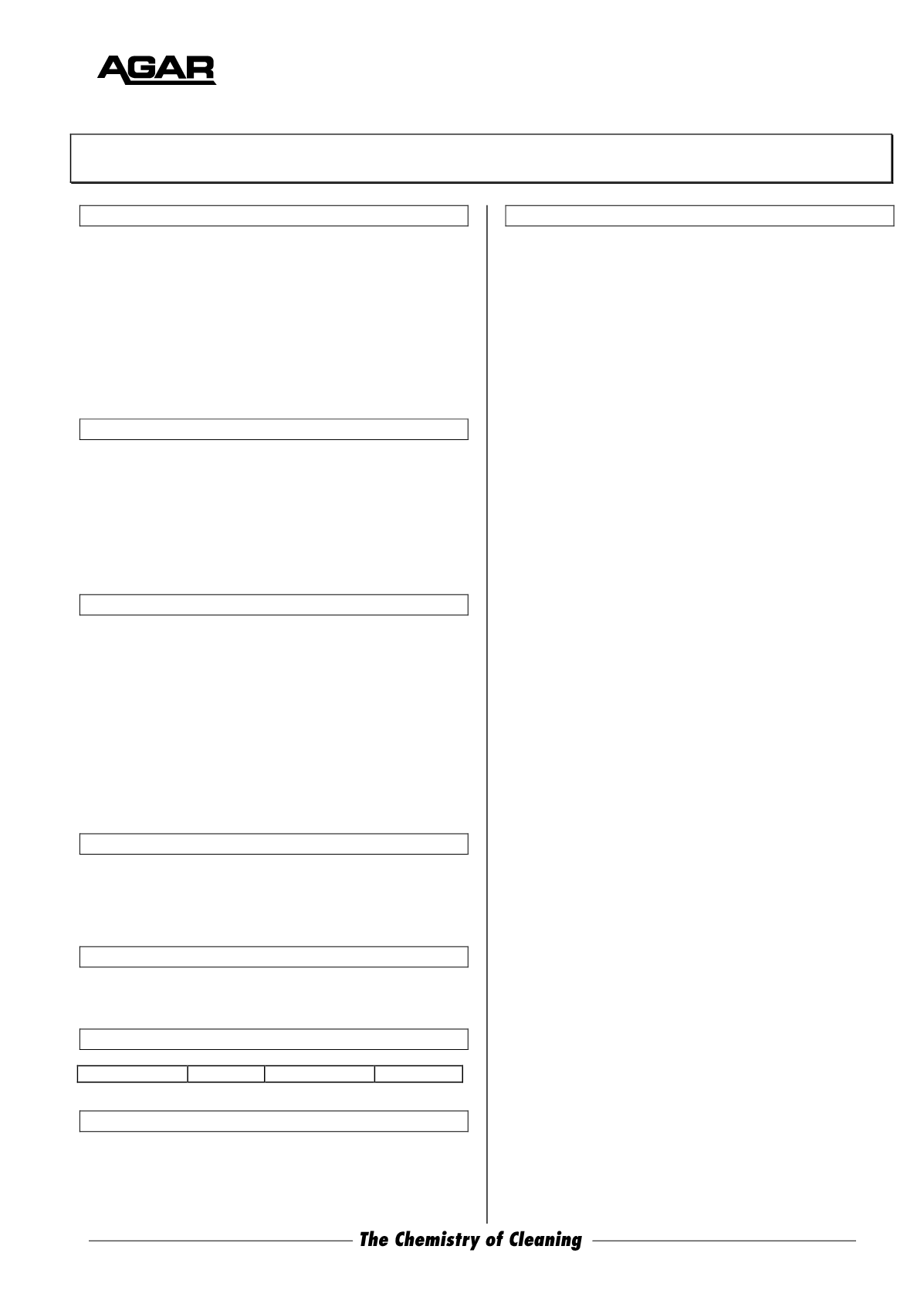

ABN 80 004 726 890
MADE IN AUSTRALIA
Safety Data Sheet
Issued: December 10, 2015
Page 2 of 2
CM-X
9 PHYSICAL AND CHEMICAL PROPERTIES
Appearance: Clear, yellow liquid.
Odour: Slight acid fume
pH = 0.0 – 0.5
Vapour Pressure: N/K
Vapour Density: N/K
Boiling Point: N/K
Freezing Point: < 0
°
C
Solubility in water: Infinitely miscible
Specific Gravity: 1.19 (20
°
C)
Evaporation rate: As water
% Volatile by vol: 0%
10 STABILITY AND REACTIVITY
CM-X is stable.
CM-X and its solutions will etch and damage zinc, diecast and
other soft metal alloys as well as terrazzo, limestone and
marble. CM-X should not be allowed to come into contact with
these materials.
Hazardous polymerization: Will not occur.
11 TOXICOLOGICAL INFORMATION
Health Effects:
Acute -
Swallowed:
Moderately toxic. Moderately corrosive – causes
burns and desquamation to the mouth, oesophagus and
stomach.
Eye:
Moderately corrosive – causes burns and desquamation.
Skin:
Irritant to the skin.
Inhaled:
Moderately irritative. Moderately corrosive – causes
burns and desquamation to the respiratory tract (including
mucous membranes, throat and lungs).
Health Effects -
Chronic
: No data available.
12 ECOLOGICAL INFORMATION
Ecotoxicity: No data available.
Persistence and degradability: -
Mobility: -
Advice: -
13 DISPOSAL CONSIDERATIONS
For disposal, refer to State Land Waste Management Authority.
14 TRANSPORT INFORMATION
UN No.: 3264
Class: 8 Packg.Group: III Hazchem: 2X
15 REGULATORY INFORMATION
Poisons Schedule Number: Schedule 6
16 OTHER INFORMATION
AICS Listing:
All components of CM-X are listed on the
Australian Inventory of Chemical Substances (AICS).
Date: This SDS issued on December 10, 2015 shall remain
valid for 5 years unless a new SDS is issued in the meantime.
Please contact Agar Cleaning Systems P/L to ensure you have
the latest version of this product’s SDS.
Abbreviations and Definitions of terms used:
<
less than
>
greater than
AICS
Australian Inventory of Chemical
Substances
CAS
Chemical Abstracts Service (Registry
Number)
COD Chemical Oxygen Demand
deg C Degrees Celsius
g
gram
g/L grams per litre
HSIS
Hazardous Substance Information System
IARC
International Agency for Research on
Cancer
kg
kilogram
L
Litre
LC50
The concentration of a material (inhaled)
that will be lethal to 50% of the test animals.
LD50
The dose (swallowed all at once) which is
lethal to 50% of a group of test animals.
m3
Cubic metre
mg
milligram
mg/m3 milligrams per cubic metre
miscible A liquid that mixes homogeneously with
another liquid
N/A
Not applicable
N/K
Not Known
NIOSH
National Institute for Occupational Safety
and Health
NOHSC National Occupational Health and Safety
Council
non-haz Non- hazardous
PEL
Permissible Exposure Limit
ppb
Parts per billion
ppm Parts per million
STEL Short term exposure limit
TLV
Threshold Limit Value
TWA
Time Weighted average
UN
United Nations (Number)
wt
weight
The information in this Data Sheet is based on our present
knowledge. However, this shall not constitute a guarantee for
any specific product features and shall not establish a legally
valid contractual relationship. As far as lawfully possible, Agar
Cleaning Systems accepts no liability for any loss, injury or
damage (including consequential loss) suffered or incurred by
any person as a consequence of reliance on the information
and advice contained herein.
End of SDS.


















